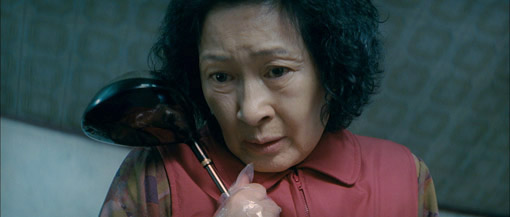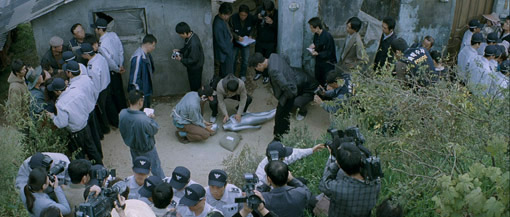|
As opening sequences go, Mother has one of the oddest and most curiously entrancing I've seen for some time. The middle-aged Mother of the title wanders into a grassy field, her face bearing the signs of emotional wear, then stops to look directly at the camera and start dancing to a latin beat that drifts onto the soundtrack. Her expression varies little but her movements are both elegant and intermittently energetic, as if her body is being controlled by an exterior force that is indifferent to her will. It's a strangely dream-like sequence that has no bearing on what immediately follows, but by the end it actually makes a curious kind of sense.
Not being a woman, a parent, or fond of children in any shape of form, the strength and controlling power of the maternal instinct is something I can neither experience nor empathically understand. It's a fact of life that most of us tend not to full appreciate just how important this biological bond was to our journey to adulthood until adulthood is reached. In extreme cases it can and will cloud rational judgement, a refusal to believe that my son – my son – could have done what the evidence clearly indicates that he damned well did. But it can also fuel an almost superhuman determination to fight for their innocence should they be wrongly accused or convicted.

Such is the foundation for Korean director Bong Joon-ho's latest film, Mother [Madeo]. The son in question here is the twenty eight-year-old, mentally challenged Do-joon, who when stumbling home after an evening of drinking has a verbal encounter with a teenage girl, who retreats into the darkness of an abandoned house and sends him sharply on his way. The following morning her body is discovered dangling over a railing on this same building's roof. The evidence is circumstantial but enough for the police to arrest Do-joon for the crime, who they easily trick into signing a confession. His mother, with whom he lives and who dotes on her boy, refuses to believe a word of it and sets about hunting for the real killer herself.
If you're looking for Mother's cinematic predecessor then you have to go back a step further than the director's multi-layered monster movie The Host [Gwoemul] to 2003 and the superb police procedural Memories of Murder [Salinui chueok]. Although in many ways very different films, there are enough similarities in tone and detail to clearly mark them as the work of the same filmmaker. Key pointers include the twisting nature of the criminal investigation, the key role played by a young male of limited intelligence, the crime scene clumsiness of the local police, the comically wild scrappiness of the ensuing brawls, and the weaving of black humour into scenes that you'd normally expect to be played straight. The intermittent character humour ranges from slapstick (Do-joon's hilariously misjudged attempt to drop-kick a car's wing mirror) to tragicomic (his cheery wave to his mother as he is led to the crime scene before a crowd of hostile onlookers), and even takes on a threatening edge with the interrogating detective whose intimidation technique involves kicking an apple from the bemused Do-joon's mouth.
These light-hearted moments are largely confined to the first act, as following Do-joon's unsound conviction the film takes on a darker tone, one that sits well with Mother's emotional pain and dark determination to clear her son's name, whatever the cost. This single-mindedness initially handicaps her investigation, sending her down blind alleys and prompting her to misread evidence because it appears to fit her version of what probably happened, which is the exactly what she believes the police have done. Games are played with expectations and conventions – that Mother is eventually aided in her quest by Do-joon's manipulative friend Jin-tae may not seem surprising on paper, but it comes at a cash price rather than as a result of his friendship or his belief in Do-joon's innocence. His later arrival as a mechanism of brute force to persuade a pair of unwilling witnesses is timed with the sort of audience-pleasing perfection that made the plot twists in Memories of Murder such a joy.

Bong's direction is at its most precision-tooled here, from the detail-crammed wide shots to scene-shift edits that transform the offbeat into the genuinely comical (the first shot of Do-joon following his incarceration finds him shadow-puppeteering on the interrogation room wall), while the car crash that follows Do-joon's police abduction is as startling a combination of timing, camera angle misdirection and heart-jumping sound design as you'll experience all year. When tension is required, Bong can wring it from the scene, notably when Mother quietly tip-toes past a sleeping couple carrying potentially damning evidence, her progress halted when she knocks over a water bottle and becomes mesmerised by the spilt liquid's approach to a dangling hand. He's also a master of the anticipational wind-up, twice having Mother distractedly cutting herbs with a guillotine, an action that on both occasions looks set to result in severed fingers.
The performances are all uniformly impressive, but the shining star around which the entire drama orbits is Kim Hye-ja, a highly respected figure in Korean theatre and television who is consistently superb in the title role. This is not the sort of showy, award baiting performance of Hollywood dramas, but one of surface restraint and a suppressed inner fire, which explodes in moments of extreme distress and electrifyingly flashes when Mother attends the murdered girl's funeral and assures the family that her son is innocent – her face remains calm but her eyes momentarily burn with defiant anger. That she is never actually named puts the focus on her familial status and her relationship with her son. It's a role she inhabits beyond the paternal norm, allowing Do-joon to share her bed and following him into the street with his unfinished meal, which she feeds to him while he publicly urinates, evidence of which she then hurriedly conceals. There is, it turns out, a good reason for her devotion, one buried in the past and driven by guilt, and whose ferocity later takes the film into the sort of morally complex areas that continue to separate Korean cinema from its equivalent just about anywhere else.
Much as I loved The Host (check out our review for confirmation), I couldn't help but feel a surge of delight that Bong has returned to the ground that first brought him to international attention. If I was forced to choose I'd still have to pick Memories of Murder as my favourite of his films, but that could well be down to my fondness for police procedural dramas and the fact that I've seen it ten times to Mother's one (a restriction of having to return the review disc). Trickier to comfortably categorise than those previous two features, Mother is a compellingly constructed melding of crime drama and character study, one peppered with offbeat detail, humour and sly social commentary. Alternately intriguing, tense, funny, moving and deeply unsettling, it may not leave with a cheery smile on your face, but like a mother's love, it really will stay with you.
Just as Memories of Murder set the standard for pristine DVD transfers (at least the Korean and Hong Kong discs did), Mother is a showcase for the tonal loveliness and crispness of Blu-ray. This is an excellent transfer with an eye-popping sharpness that's clearly visible on background detail, faces and any textured surface. Colours have a lovely tonal richness and handle the film's subtle tinting well, and the pitch-perfect contrast achieves crisp black levels without sacrificing shadow detail. The film was shot on 35mm with anamorphic lenses, an increasingly rare choice in the days of Super-35 (where the image is cropped to scope) and high-end digital, and it really pays off here.

You can choose between Dolby stereo 2.0 and DTS-HD Master Audio 5.1 surround, and there really is no contest here. The DTS-HD track is an impressive yet never overplayed beast, boasting a superb clarity and dynamic range and a very specific use of the full sound stage for effects and atmospherics – wind and heavy rain are vividly rendered, as is the crisp crackle and bass roar of a building fire. Despite clear dialogue and decent frontal separation, the Dolby 2.0 feels a little flat by comparison, and the aural jolt delivered by aforementioned car crash is nowhere near as effective there.
The Making of Mother (42:58)
Cast and crew interviews are cut with chronologically organised behind-the-scenes footage to chart the development and making of the film. There are plenty of interesting stories and comments, but the real attraction is watching Bong work with his actors, and the number of takes he will sometimes demand to get the shot or the performance he wants. He intriguingly reveals that he cannot really grasp the definition of realism, while a female cast member tellingly suggests that "motherly love is a magic, stronger than you can possibly imagine," which by all rights should be up on the poster. I can't tell you who said it because although the dialogue is subtitled, the name and job captions are not.
The Transformation of Kim Hye-ja (7:01)
The widely respected lead actress talks about her move from television to film and her work on Mother, which is supported by contributions from others (once again the name and job captions are not translated) and some fascinating footage of Kim at work. Having worked with an actress who took some time to recover from an emotional scene, it was intriguing to watch Kim really let loose and then switch it off a mere second after the scene was cut.
The Cast and Crew Reflect (5:54)
Effectively a six-minute continuation of the first extra.
Trailer (1:39)
A less than crisp trailer that misleadingly sells the film as a pacy thriller.
Can Bong Joon-ho put a foot wrong? Not on the evidence of his film career to date, and having directed a great crime drama, a great monster movie and the best segment by far in the 2008 Tokyo!, he shows absolutely no sign of losing his grip. Mother is a complex, emotionally involving, multi-layered story, immaculately told and built around a superb central performance from Kim Hye-ja, and it looks and sounds excellent on Optimum's Blu-ray. Highly recommended.
|